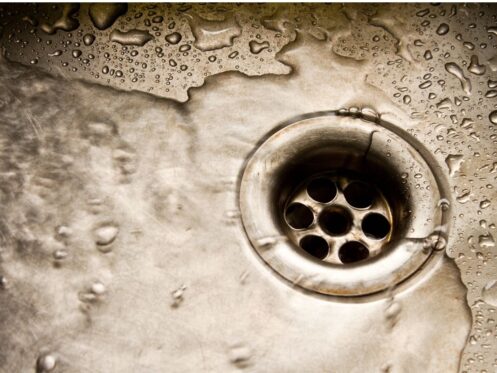As spring showers roll in, Jerome, ID, sees fresh blooms and a sense of renewal. But the rain can also put extra pressure on your home’s plumbing system. Slow drains may seem minor, but heavy rain can quickly escalate them into serious problems like clogs or backups.
In this blog, we’ll cover the common causes behind slow drains, why they shouldn’t be ignored, and easy DIY fixes you can try. We’ll also help you recognize the signs that it’s time to call a professional plumber for expert assistance. Ready to tackle those slow drains? Let’s get started!
Common Causes of Slow Drains
Before we jump into solutions, it’s important to understand what might be causing your slow drains. Here are a few common culprits:
1. Hair, Soap, and Other Build-Up
Bathroom sinks, tubs, and showers are frequent victims of hair and soap residue build-up. Over time, the combination of these materials creates clogs that slow water flow through the pipes.
Pro Tip: Consider using drain covers to catch hair before it slides down the drain.
2. Grease and Food Particles
Kitchen drains often suffer from improper disposal of grease, oil, and food scraps. While these particles might seem harmless in small amounts, they can bind together inside the pipes, creating sticky clogs.
Reminder: Avoid pouring cooking grease down the sink. Instead, collect it in a jar and dispose of it in the trash.
3. Hard Water Deposits
Jerome, Idaho, is known for hard water. Hard water is water with high concentrations with dissolved minerals such as calcium and magnesium ion. Over time, hard water can lead to several issues, including scale buildup, wear and tear, and corrosion. This scale buildup can reduce the inner pipe diameter and slow water flow.
4. Faulty Pipe Design or Damage
Pipes with incorrect slopes, narrow diameters, or damage like cracks and leaks can also cause water to drain more slowly than it should.
Why Slow Drains Are a Problem
You may be tempted to put off dealing with slow drains, thinking they’re more of an annoyance than a real issue. However, delaying the fix can cause pipe damage over time, leading to more serious issues that can jeopardize your health and safety.
Left unchecked, slow drains can cause the following problems:
- Health hazards: Standing water that becomes a breeding ground for mold, mildew, and bacteria.
- Foul odors: Trapped food waste or grease can start to decay, creating persistent, unpleasant smells.
- Water damage: Overflowing drains can lead to mold growth and structural damage to your walls, floors, and furniture.
- Plumbing strain: Severe clogs can put added pressure on the rest of your plumbing system, increasing the risk of leaks, pipe failure, and wide extensive damage.
Catching and addressing slow drains early can save you from bigger (and more expensive) issues down the road.
How to Fix Slow Drains
If you’ve noticed any slow drains around your home, don’t panic—there are several DIY fixes you can try before calling in the pros.
1. Try Baking Soda and Vinegar
This tried-and-true method works for many basic clogs. Here’s how:
- Pour 1 cup of baking soda down the drain.
- Follow it with 1 cup of white vinegar.
- Cover the drain, wait 15 minutes, and flush with hot water.
The chemical reaction can help dislodge light build-up in the pipes.
2. Use a Plunger
For bathroom sinks or tubs, a plunger can create enough pressure to help clear clogs. Make sure there is a seal around the drain to apply consistent suction.
3. Try a Drain Snake
For tougher clogs, a drain snake (available at hardware stores) can do wonders. It’s a long, flexible tool that you feed into the pipe to manually break up a clog.
4. Use Enzyme-Based Cleaners
Unlike harsh chemical drain cleaners, enzyme-based alternatives break down organic material without damaging your pipes. Look for these at your local hardware or home improvement store.
5. Flush Outdoor Drains
Outdoor drains collect leaves, dirt, and other debris. Make sure to clear visible debris and flush these drains with a hose periodically to keep them flowing during spring rains.
When to Call a Plumber
While many slow drains are simple DIY fixes, there are situations where it’s best to bring in a professional plumber—especially if you’re dealing with recurring issues or more serious blockages. Call a plumber if:
- Your Drains Remain Slow After DIY Fixes: Persistent issues might indicate a deeper clog or pipe damage.
- You Notice Water Backing Up: Water coming up in sinks or tubs is a red flag for a bigger issue, like a sewer line problem.
- Foul Smells Persist: If odors linger even after cleaning, there could be trapped debris deeper in the pipe.
- Multiple Drains Are Slow: If slow drainage is affecting multiple drains throughout your home, you could have a bigger issue with your main sewer line.
For Jerome homeowners dealing with any of these challenges, the team at Magic Electric, Plumbing, Heating + Air is ready to help.
Protect Your Home This Spring
Slow drains don’t have to disrupt your home—especially when you tackle the issue early. By understanding the causes and trying simple solutions, you can keep your plumbing ready for any spring showers Jerome might bring.
Need professional help? The qualified team at Magic Electric, Plumbing, Heating + Air is just a phone call away. Whether for a stubborn clog, foul smells, or a preventative drain inspection, we’re here to ensure your plumbing system runs smoothly.
Contact us today to schedule a service or consultation. Don’t wait until the next storm—protect your home this spring with plumbing you can count on!


